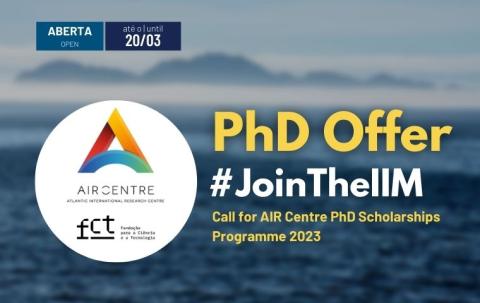Únete ao IIM | Oportunidades de Doutorado (AIR Centre 2023)
O Instituto de Investigaciones Mariñas (IIM-CSIC) ofrece un tema de investigación para solicitar unha bolsa pre-doctoctoral no noso centro, dentro do programa Bolsas Doutorado Centro AIR – 2023 (Fundação para a Ciência e a Tecnologia - FCT).
Estas axudas teñen como obxecto fortalecer os lazos de colaboración existentes entre institucións e desenvolver novas colaboracións entre o Centro AIR e a comunidade científica portuguesa promovendo a cooperación entre institucións lusas e doutros países atlánticos.
O traballo de investigación doutoral realizarase no Instituto de Investigacións Mariñas, cunha estadía parcial en institucións portuguesas.
A bolsa de doutoramento é anual, renovable ata o número máximo de meses solicitados na solicitude e non pode concederse por un período inferior a 3 meses consecutivos nin superior.
Únete ao Instituto e impulsa a túa carreira connosco!
Por que o IIM?
O Instituto pertence ó Consejo Superior de Investigaciones Científicas, a maior organización de investigación de España, a terceira de Europa e a sétima do mundo. O IIM-CSIC é un dos institutos líderes en investigación mariña en España, cunha actividade diversa e unidades estratéxicas propias de Internacionalización, Transferencia e Cultura Científica. Con sede na cidade de Vigo, ofrecemos unha entorno de investigación dinámico que impulsa a carreira do noso persoal, ampliando as súas redes de colaboración e aumentando o seu impacto real na sociedade.
Somos unha institución de acollida moi competitiva que ofrece a contorna ideal para fomentar e consolidar ao persoal investigador en calquera etapa da súa carreira.
Un proxecto para impulsar a túa carreira
Con respecto á Convocatoria Bolsas Doutorado Centro AIR – 2023, a oferta do IIM-CSIC será supervisada por Antonio Padín e Fiz Pérez, ambos os investigadores no grupo de Procesos Oceánicos en Cambio Global. Aquí debaixo, os detalles:
The sustained ocean carbon sink uptakes ∼37% of the fossil fuel CO2 emissions, or ∼25% of the combined fossil fuel burning and emissions due to land use changes between 1850 and 2019. This uptake of CO2 is causing profound changes in seawater chemistry resulting from increased hydrogen ion concentration (decrease in pH), referred to as ocean acidification. Experimental and modelling studies provide compelling evidence that ocean acidification will put marine ecosystems at risk especially in coastal areas that provide marine resources and important ecosystem services to support human society. The coastal ocean, which is characterized by elevated primary production and is the site for long-term burial of organic matter and calcium carbonate (CaCO3), provides a highly dynamic land-ocean interface complicated by anthropogenic perturbations that act across the land-ocean continuum and evolve over time. Including the coastal ocean as a component of the global carbon cycle is critical for developing carbon and climate policies. And, among these coastal regions, the upwelling systems are especially important by accounting for ~20% of the global fish catch in spite of constituting <1% of the world’s oceans by area. Moreover, the responses of the upwelling systems to climate changes have a strong influence on their biogeochemistry and productivity, with serious socio-economic consequences.
The aim of this study initiative, besides serving as training in the analytical aspects of different parameters of the carbon system, is also to generate the necessary knowledge on the evolution of ocean-atmosphere CO2 fluxes and ocean acidification in the upwelling system of the Iberian Peninsula, along the coast of Galicia and Portugal. This study will be divided into different task such as: i) Participation in coastal oceanographic cruises for the sampling and analysis of inorganic carbon variables and ancillary variables in the Portugal and south Galician coast in order to expand the international public databases (GLODAP-CODAP); ii) Development of a synoptic climatology of pH and air-sea CO2 fluxes in the coastal waters of the Iberian Peninsula, using feedforward neural networks trained with observations; iii) Use of multivariate and other statistical analysis to identify and quantify the environmental drivers at different spatial and temporal scale, and iv) Evaluation of the future scenarios of the marine carbonate system of the Iberian upwelling ecosystem through the model projections of the Coupled Model Intercomparison Project Phase 6 after evaluation and weighting of the same using the observations and data products obtained in the present.
This work is supported by SCOR (Scientific Committee on Oceanic Research) and progress will be presented regularly to the Portuguese Committee of this research organisation.
Profile of applicants
-
The candidates should have an academic background in marine science, marine biology, physical oceanography or marine chemistry. Skills in computing programming and database analyses are required.
Supervisors
Fiz Fernández Perez (IIM-CSIC) fiz.perez@iim.csic.es.
Antonio Padin Alvarez (IIM-CSIC) padin@iim.csic.es
Jesus Dubert (CESAM, Universidade de Aveiro)
Hosting institutions
Universidade de Aveiro (Portugal)
PhD Programme
Do*Mar – Marine Science, Technology and Management
Antes de realizar os trámites, asegúrate de ler detidamente a Convocatoria e de que cumprir cos requisitos de elixibilidade.
Para enviar a túa solicitude, deberás utilizar a plataforma da sede electrónica de o Atlantic International Research Centre .
O prazo para o envío termina o 20 de Marzo de 2023 ás 23:59h (WET - Lisboa).
Cada persoa solicitante poderá presentar unicamente unha solicitude que virá referida á o proxecto de investigación de interese. No caso de IIM-CSIC: "Marine carbonate system in the NW Atlantic upwelling ecosystem,"
Información importante

